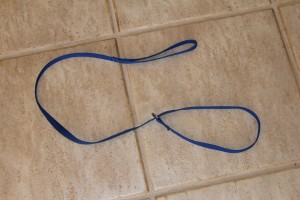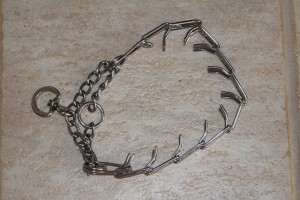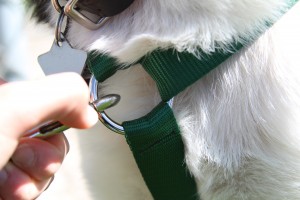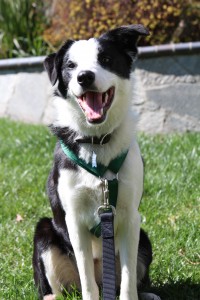Socks, the cat, likes to watch Tessa play frisbee. She just sits and watches. 🙂
Socks, the cat, likes to watch Tessa play frisbee. She just sits and watches. 🙂
Tessa has loved water ever since she was a young puppy. She especially loves the hose. I have taken advantage of this by using it as a reward.
Here is another treat idea. This movie explains how to make a fun and easy high value reward for your dog.
If taken out of the freezer just before use, this treat can last a long time. I bring it with me all the time when I go on walks with Tessa up on the hill and practice recalls.
This treat can be given to a dog to keep him/her busy for about 15-30 minutes.
The music in this video can be found at: FreePlay Music
This is Jasper, my sister’s new rabbit. He is a 10 month old Dutch Panda. We just got him today.
Stay tuned for more of Jasper!
Here are five exercises to do to help fix mild cases of food aggression in dogs. Food aggression is a lack of trust. The dog thinks that you are going to take away his/her food and guards it. It is best to deal with this problem in the beginning to prevent it from getting worse. You can use clicker training to build a positive association with you being around your dog’s food.
Here is a list of the 5 exercises demonstrated in the video:
1) Ask for tricks and behaviors
2) Hand feeding
3) Trade game
4) Dropping treat in bowl while passing by
5) Handling exercise
Caution: These exercises may not be safe to do with dogs who have more extreme cases of food aggression. Always be careful when working with a dog with food aggression. For more serious cases, contact a professional.
Never punish your dog for showing aggression in any way. Over time, punishing your dog can result in a dog who doesn’t show warning signs before biting creating a dog who is very dangerous to be around. It also creates fear and doesn’t actually solve the behavior.
Additional tips:
I have a movie on my main YT channel, ClickerPets, that may also help with mild cases of food aggression. It is a fun, mentally stimulating puzzle game that involves the dog’s meal. It is called the Triple Cup Kibble Challenge. Here is the link:
http://www.youtube.com/watch?v=jrgXgTMEkTQ
When you don’t have time to work with your dog during his/her meal, you can use prevention so your dog doesn’t end up showing aggression and practicing this behavior. Here are some tips:
1) Feed your dog little amounts throughout the day
2) Give your dog a Kong with his/her food in it
3) If you have a young puppy, take away his/her food and give it back with something better, like cream cheese, peanut butter, yogurt, cottage cheese – this creates a positive response in the beginning, setting a good foundation and preventing food aggression
4) With very young puppies, dangle your hand in their food. Do not use this techinque for dogs who already have food aggression
5) Make a “Peanut Butter Cup” for your dog. Click the video link below to see how you can make one for your dog:
http://www.youtube.com/watch?v=nIdPU6v1_4o
If you have any questions, please leave a comment below.
When clipping the leash onto your dog’s collar just before a walk, you may not be aware of the dangers and risks of possible injury that you are exposing your dog to. Many people don’t realize that pressure on a dog’s collar, if the dogs pulls, can cause serious neck injuries. Just like a human’s neck, a dog’s neck is fragile. Maybe your dog doesn’t pull, but you never know when he could react to something and lunge. And there might be a situation where you have to pull your dog away from something dangerous and you wouldn’t want that pressure to go on their neck.
Choke chains, prong collars, slip leads and martingale collars are not only inhumane, but they can cause serious injury to your dog’s neck. Pressure on a dog’s neck sends stress hormones to the brain, making the dog more aroused, so attempts to correct an aggressive (barking at other dogs) or excitement behavior (like jumping on people) with a jerk just makes the behavior worse. Pressure on the neck restricts blood-flow to the brain and also can obstruct breathing because the collar rests right by the larynx. That is why you hear dogs hacking when they are pulling really hard.

Slip lead - Slip leads are used in Agility and other dog sports where a collar or harness would be in the way and take too long to put on and take off. A slip lead is like a leash and collar in one.

Prong Collar - Prong collars are used to give corrections by jerking on the leash that is attached to the collar. The prong collar is supposedly more humane than a choke chain, but really has the same risk factors.
Using these collars causes stress on your dog, decreasing their quality of life, however not only are these collars bad, but your dog’s regular collar can injure your dog just as these choking devices do.
In conclusion, when going for a walk a leash should never be attached to your dog’s regular collar, or to any other choking device and you should not use a slip lead. The best piece of equipment to use is a harness. Harnesses may be more expensive and take longer to put on, but they are more secure, and most importantly, are not causing any damage to your dog if he pulls or lunges.
A common misconception of harness is that harnesses teach your dog to pull. This is partially true. While walking forward as your dog is pulling (no matter what the dog is wearing) will reinforce pulling on a leash, a back clipping harness is reinforcing for dogs to pull into and it also gives them more leverage to pull you. A simple solution is to either not walk forward while your dog is pulling (stop or turn around when your dog pulls) or clip the harness in the front. A harness like this one, is great because if you have a strong dog who likes to pull, you can clip the leash in the front, giving your dog less leverage to pull you.

For large dogs that pull, clip the leash to the loop in the front of the harness. This gives the dog less leverage to pull.

Tessa demonstrates how the leash can be clipped to the front of the harness. Notice how happy Tessa is to model the harness, she wouldn't be smiling if I was demonstrating a martingale or prong collar.
When I found out what risks there are to walking your dog on a collar, using choke collars or slip leads, I decided that I will never attach the leash to our dogs’ collars. Even though they walk well on the leash, it is not worth the risk.
If you are ready to make the decision to buy a harness, I would suggest that you buy a Roman harness. Amazon has great prices on harnesses.
If you have any questions about harnesses, collars or any piece of equipment that you would attach the leash to, please email me at clickerpets@ymail.com. Thanks!
Here is our short Saint Patrick’s Day movie. The tricks performed by Java and Tessa include, leg weave, paws up, the sword fighting trick (jumping over moving stick), cop cop (your feet on mine), go around, bow, go under, go under, spin in sync. with me, jump over the stick, fetch.
Happy Saint Patrick’s Day!
Clicker games are fun games to play with your dog that teach your dog to be creative in the behaviors that he/she offers. In this tutorial, you will learn how to do a clicker game with your dog. With this game, you will wait and capture a behavior that your dog offers and then shape it. This game is very similar to free shaping, except you don’t have a goal of a specific behavior that you want to teach.
If you have any questions, please leave a comment below of email me at clickerpets@ymail.com. Thanks!
We just got our new frisbees from Hero Discs. I was so excited that I had to try them out, even though it was raining. Tessa didn’t mind the rain. She needed a little time to get used to the frisbees and then, she got it. I think that these frisbees are really going to benefit her, she really needed some better frisbees.
Incase you’re wondering, we got the Hero Distance and the Hero Air.